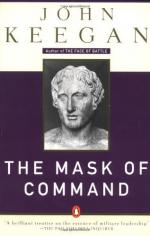
|
| Name: _________________________ | Period: ___________________ |
This test consists of 15 multiple choice questions and 5 short answer questions.
Multiple Choice Questions
1. The closest tally of battles and sieges reached included _____________ battles and eight sieges, not counting those Wellington participated in as a subordinate.
(a) Sixteen.
(b) Eight.
(c) Ten.
(d) Four.
2. Alexander had a select infantry known as _______________, whose main job it was to surround and protect Alexander.
(a) The Shield Bearers.
(b) The Secret Service.
(c) The Body Guards.
(d) The Elite.
3. Wellington so impressed Castlereagh that the thirty-seven-year-old soldier was soon a trusted confidant and advisor on one military scheme after another. One of those schemes included keeping an eye on whose activities?
(a) King Richard's.
(b) George Washington's.
(c) Napoleon's.
(d) Kaiser Wilhelm.
4. Like many royals, Alexander had a tutor. Alexander's tutor of __________ years also happened to be a brilliant student of Plato's, a man named Aristotle.
(a) Six.
(b) Five.
(c) Four.
(d) Three.
5. Why did many of the other soldiers view Wellington with some jealousy?
(a) He was the son of a duke.
(b) He was very wealthy.
(c) He was the king's nephew.
(d) He was the son of a marginal lord.
6. The spears were ________________ feet long and quite heavy; therefore, they were not used in battle per se, although they might be seen on the periphery.
(a) Ten.
(b) Twenty.
(c) Eighteen.
(d) Five.
7. How did Wellington dress when going into battle?
(a) Like a French commanding officer.
(b) Like a civilian.
(c) Like a commanding officer.
(d) Like an American soldier.
8. When was Alexander born?
(a) July 635 BC.
(b) July 653 BC.
(c) July 356 BC.
(d) July 365 BC.
9. Alexander developed a reverence for what Greek god?
(a) Hercules.
(b) Dionysus.
(c) Zeus.
(d) Poseidon.
10. In 1806, Wellington realized what dream?
(a) Of becoming a military leader.
(b) Of graduating from college.
(c) Of being accepted by his military peers.
(d) Of being married.
11. The first piece of news about Napoleon's attack on the Prussians reached Wellington while he was preparing to do what?
(a) Go to sleep.
(b) Eat dinner.
(c) Attend a ball.
(d) Plan an attack.
12. Many of the soldiers were considered to be ___________ by Alexander.
(a) Strangers.
(b) Friends.
(c) Enemies.
(d) Family.
13. It is surmised that both Wellington and Napoleon, uniquely adept at grasping higher learning concepts, may have been exposed to a classical learning technique that involved the use of _______________.
(a) Mnemonic devices.
(b) Flash cards.
(c) Technology.
(d) Tutors.
14. What war did an uprising in Spain and Portugal against the French emperor later become?
(a) The European War.
(b) The Peninsular War.
(c) The Spanish Civil War.
(d) The English Civil War.
15. Alexander was the __________________ son of Philip II of Macedonia and Olympias.
(a) Youngest.
(b) Eldest.
(c) Only.
(d) Middle.
Short Answer Questions
1. What was the name of Alexander's famous horse?
2. Wellington was well known for having _____________ routine, which is credited for much of his success in planning campaigns.
3. In Alexander's day, many men made their living by performing as what?
4. Even with _________________ soldiers, Darius was unable to outsmart Alexander, who perfectly executed a plan to attack Darius from the rear rather than wait to face the ruler head on at Cilicia.
5. In ____________, Wellington was awarded with the Order of the Garter as well as a field marshal's baton.
|
This section contains 485 words (approx. 2 pages at 300 words per page) |

|




